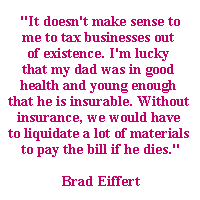|
Effort to end estate tax
|
 |
June 5, 2000: 12:09 p.m. ET
Some small business owners pin hopes of ending levy on bills in Congress
By Staff Writer Hope Hamashige
|
NEW YORK (CNNfn) - Come August, John Kearny is going to make out the two biggest checks he's ever written in his life. The first, for $260,000, will go to the Internal Revenue Service. The second, for $90,000, will be sent off to New York's state tax division in Albany.
All this because his father passed away in November and left his legacy, a small automobile dealership, to his son. The tax Kearny is paying off is called, depending on how you feel about it, either the death tax or the estate tax.
Small business owners such as Kearny complain that the tax, which ranges from 37 to 55 percent, is one of the main reasons family businesses aren't passed down from one generation to the next.
It's too late now for John Kearny. He has already settled his bill with the government and has agreed to pay up near the end of summer. But he still favors repealing the tax, and was recently in Washington, D.C., lobbying for its demise. He may get his wish this week when the House of Representatives votes on the issue.
"If there was no death tax I would have had his money to use in the business. If they eliminate it, it's not going to save me any money," said Kearny. "I still support the bill because the death tax just isn't fair."
Saving for the death tax can be expensive
Most small business owners complain the tax hinders their ability to expand their businesses, hire more people and make the improvements they need to compete.
 Brad Eiffert now manages the lumberyard his father started in 1965. Knowing that some day he will inherit Boone County Lumber, based in Columbia, Mo., Eiffert took out a life insurance policy on his father several years ago to cover the taxes he will have to pay when his father passes away. Brad Eiffert now manages the lumberyard his father started in 1965. Knowing that some day he will inherit Boone County Lumber, based in Columbia, Mo., Eiffert took out a life insurance policy on his father several years ago to cover the taxes he will have to pay when his father passes away.
Eiffert finds some comfort knowing he will not lose the business when his father dies. In the meantime, however, he is paying $36,000 on the insurance policy, money that he wishes he could use to make some capital improvements at the yard.
"It doesn't make sense to me to tax businesses out of existence," said Eiffert. "I'm lucky that my dad was in good health and young enough that he is insurable. Without insurance, we would have to liquidate a lot of materials to pay the bill if he dies."
Although it seems costly to him, Eiffert may be getting off easy. According to the National Federation of Independent Business, those family firms that are taking steps to help the next generation survive the estate tax burden with the business intact spend, on average, nearly $125,000 in attorneys fees, consultants fees and insurance costs.
Asset rich, but cash poor
Worse than simply hindering their ability to expand, many small businesses are forced to liquidate assets, like land and inventory, because they don't have enough money to pay the estate tax bill when one generation inherits from another.
The problem for many small business owners is that while they possess assets, such as land and inventory, many don't have a lot of cash on hand. As a result, many small business owners have no choice but to liquidate those assets to pay their tax bills.
Many legislators are supporting a repeal of the tax because they have heard stories of farmers selling their land to developers to pay off their estate taxes. In states such as Oregon and Washington, many owners of small family-owned timber businesses have done additional logging to cover estate tax bills.
Rep. Jennifer Dunn, R-Wash., recently noted in a statement that the death tax hurts the ability of small businesses to compete and may also be one of the main reasons that family businesses don't get passed down to the next generation.
"Today, the death tax destroys family businesses and stifles investment that leads to increases in jobs and personal income. As a result, 70 percent of family-owned businesses are not passed on to the next generation and 87 percent do not make it to the third generation," Dunn said.
Where it stands
The bill, sponsored by Dunn, has bipartisan support and sailed through the House Ways and Committee a few weeks ago on a 24-to-11 vote. If passed, the bill would phase out the tax over the next 10 years.
A similar estate tax elimination provision was included in a spending bill passed by Congress last year. But President Clinton vetoed that bill, saying that while he wants to help heirs keep their family businesses healthy without liquidating assets, he believes a total elimination of the estate tax goes too far.
The White House estimates that elimination of the estate tax will cost the federal government $13 billion over 7 years and $27 billion over 10 years, and believes it would benefit only the wealthiest business owners.
A companion to Dunn's legislation, sponsored by Sen. John Kyl, R-Ariz., is making its way through the Senate. It has been referred to the Senate Finance Committee, which has yet to schedule any action on the bill. 
|
|
|
|
|
 |

|

